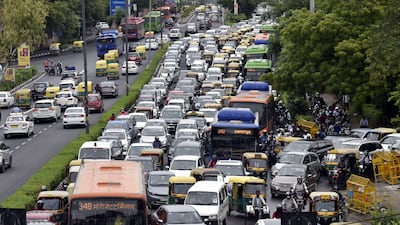While India's government raises eyebrows by drawing out its green transition until 2070, electric car makers plan to speed up the process on the country's roads.
Indian motor industry leaders used the Cop26 climate summit in Glasgow to unveil a plan for nearly two thirds of new vehicles to be electric by 2030.
This would include 70 per cent of India’s vast two-wheeler market, as well as 30 per cent of cars and 15 per cent of goods lorries.
People involved with the project believe a drive for green transport in India could spur other emerging economies into action.
Speaking at Cop26, they said it could tackle air pollution and provide skilled jobs for India’s workforce as well as curbing greenhouse gas emissions.
“There’s a tremendous opportunity ahead of us,” said Naveen Munjal, the managing director of a company called Hero Electric Vehicles.
“There’s a long way to go. That whole supply chain has to be built up, the ecosystem has to be built up; the manufacturing capabilities have to come in."
"Once we begin to see that change, the change is going to be faster than what anybody expected,” he said.
Indian Prime Minister Narendra Modi used his speech at Cop26 on Monday to promise steps towards reducing emissions by 2030 by raising the country's use of renewables.
However, the 2070 deadline for reaching carbon neutrality is notably later than the targets set by other major polluters. About 80 per cent of India’s energy needs are met by coal.
Campaigners on climate change gave a mixed response. The former Maldives leader Mohamed Nasheed said the promise would turbocharge the global transition to clean energy. "While 2070 is a long way off for net zero I fully expect this to move forward, as it has in other countries, as India exits coal and starts to reap the benefits of a rapid clean energy transition," he said. "Most importantly of all, as former leader of one of the world's most climate-vulnerable countries, and ambassador of the Climate Vulnerable Forum, we can see that India's goal is getting close to being 1.5 degrees compatible."
Phasing out petrol cars is one of the UK’s priorities for the Glasgow conference. Britain plans to ban sales of polluting vehicles by 2030.
Indian business leaders said the government had provided some support for electric vehicles, but that more work was needed on charging infrastructure and opening up investment.
Nishant Arya, the vice-chairman of JBM Group, a global conglomerate, said companies should receive incentives for manufacturing and designing their cars in India.
The country of 1.4 billion people could become a “manufacturer for the world” of electric vehicles, he said.
Health benefits
“On the one hand in India, we talk about unemployment. On the other hand, in the electric vehicle sector there are huge requirements for skilled people,” Mr Arya said.
“We are also looking at the energy security of the country in this case, along with the environment and the health benefits which could come up with this.”
India is home to many of the world’s most polluted cities, including Delhi, Mumbai and Kolkata.
This pollution is thought to cause hundreds of thousands of premature deaths ever year, in addition to its negative effects on the climate.
In a letter sent to Mr Modi’s office, business leaders said slow progress towards electrification would put tens of millions of extra petrol cars on India’s roads.
It was signed by companies including car maker Volvo, tyre manufacturer Michelin and fuel company Shell, who say the electric shift could provide a $200-billion investment opportunity for India.
The government could shift momentum further towards electric vehicles by rapidly expanding green public transport, business leaders said.
In addition, electric vehicles need charging infrastructure – although the prevalence of two-wheelers means this can be fairly basic, Mr Munjal said.
He said raising the profile of electric vehicles was another challenge, especially in India’s rural hinterlands. This could open the door to more investment.
“Once we get enough traction on the ground, once we’ve got enough vehicles on the ground, that value will get asserted,” he said.
“With all of this noise, with all of this traction that we are seeing, we are seeing far more companies willing to invest into the supply chains.”
Joe Phelan, who represents the World Business Council for Sustainable Development in India, said the electric vehicle pledge was “the least that India should aim for” by 2030.
He said India’s Cop26 delegates should lend their support to the pledge at the Glasgow summit.
“India’s mobility and transport and transition are central to global efforts,” Mr Phelan said. “The result is an ambition that is designed to be both realistic and bold.”


